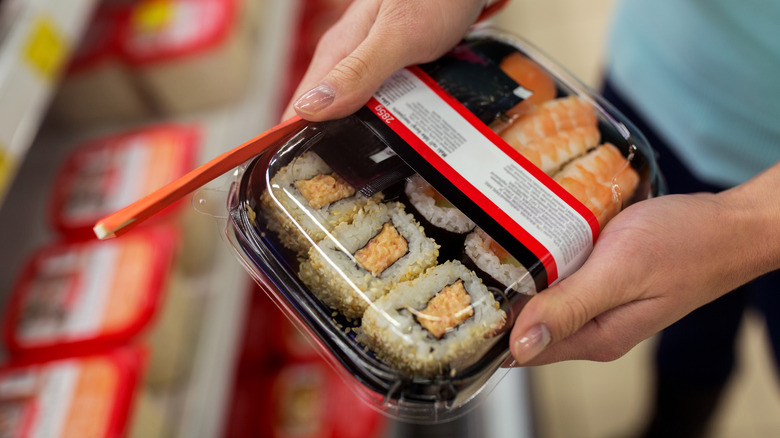The Safety Reason You Shouldn't Save Store-Bought Sushi For Later
Ten years ago, we might have turned up our noses at the thought of store-bought sushi, but these days it's easy to find a delicious, affordable snack or meal at major chains like Whole Foods, Sprouts, and even Walmart. When you're buying groceries for the week, however, you may want to think twice before buying sushi at the grocery store. While these packages are perfect for a quick lunch or dinner, think of them as more of a treat for getting your shopping done than something to save for a future date. When it comes to store-bought sushi, you'll typically want to consume it the day you purchase it.
Why all the urgency here? While many grocery store counters display sushi that was made in the store that day, the ingredients may not necessarily be at their freshest — especially since stores may get lower-quality fish than restaurants, and sushi rice can quickly spoil. Plus, some sushi counters instead sell packages that were made off-site, in which case the ingredients can already be a little old. If you need further convincing, the U.S. Department of Agriculture (USDA) only recommends keeping raw fish for up to two days in the fridge to avoid contamination from parasites or bacteria — but since we don't know when to start the clock in this case, it's best not to risk it.
The signs of fresh store-bought sushi
Here's the good news: If you throw your sushi in the fridge as soon as you get home, you can store it there for a few hours before scarfing it down. Take it out and open the package only when you're ready to eat. Just make sure you don't leave it out on the counter, since it's already been sitting out during the time it took to drive home (and possibly even longer at the grocery store). If you're worried your roll has gone bad, check for the signs: slimy ingredients, an unappealing odor, and off-putting colors.
Before you purchase your package, there are a few things to check for to ensure you buy the freshest sushi possible. First up is the expiration date, as well as any of the aforementioned signs your food has gone bad. But also, scope out the conditions of the grocery store counter. Is the station clean? Are the rolls neatly packaged? Is it possible to see the fish under the sauce (meaning the fish is fresh enough that it doesn't need to be drowned out by other ingredients)? If so, you're likely on your way to a tasty lunch — as long as you eat it that day.

